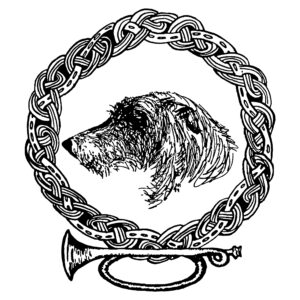Irish Wolfhound Health Information
Responsible owners make a point to educate themselves about the various diseases and health issues relevant to the breed.
Ongoing research to understand, prevent and cure disease is occurring, and owners often have opportunities to help by sharing information and enrolling their dogs in studies.
Ethical breeders strive to screen both adults and puppies for genetic diseases and carefully analyze pedigrees when making breeding decisions. Together, these efforts give us the chance to improve the health of our wonderful breed. (for information on responsible breeding see page on puppies)
Below we list some of the serious breed specific health concerns:
• Bone cancer (osteosarcoma)
• Heart disease (dilated cardiomyopathy)
• Bloat (GDV -gastric dilatation and volvulus) **medical emergency**
• Pneumonia **medical emergency**
These are the “Big Four” that owners need to know about.
Bloat and pneumonia require immediate medical attention to ensure survival. Many veterinarians are not aware that the breed is prone to pneumonia, and signs can be subtle, so it is recommended that owners be proactive and provide their veterinarian with a copy of the Irish Wolfhound Pneumonia Protocol which can be found here:
Some sighthounds, possibly including Irish Wolfhounds, experience a bleeding disorder called Delayed Post Operative Hemorrhage (secondary to hyperfibrinolysis) that can be life threatening but is preventable with medication if given prior to surgery. The significance of this mutation in the Irish Wolfhound is not known, and the Irish Wolfhound Foundation has funded a study to investigate this further.
Until the mutation is shown to be functional or non-functional, owners might wish to know if their hound carries this mutation and consider treatment if elective surgery is planned. The DNA test is available now through Washington State University and owners can order this inexpensive test kit themselves and do a simple cheek swab at home. Please share the results of this test on your hound with the Irish Wolfhound Foundation at theirishwolfhoundfoundation@gmail.com Here is the link to order the test:
DCM Research Continues
The cause of non-hereditary DCM remains unknown, but reported cases have decreased significantly. In 2019, the Food and Drug Administration (FDA) started looking at a perplexing increase in cases of canine dilated cardiomyopathy, or DCM, which is an enlarged heart. It can be fatal. DCM was largely considered a genetic issue, but without warning, cases started to appear at an alarming rate in dogs without a known genetic tendency.
The DCM case reports continued at high levels through July 2020, but have since decreased. This may be due to pet food manufacturers changing diet formulations, owners switching to different diets, or that highly susceptible dogs were identified.
Grain-Free Connection Unclear
Initially, grain-free dog food was considered a cause, so the FDA looked more closely at pulses and legumes such as peas and lentils, which were found high in the ingredient lists of foods consumed by affected dogs. Although legumes and pulses have been used in pet foods for many years without problems, the FDA found that these ingredients were in many grain-free diets in greater proportions. It's a complex situation, and many factors are likely involved. A specific connection between those diets and cases of non-hereditary DCM is still unknown. Researchers are exploring the role of genetics, underlying medical conditions, and other factors.
Taurine's Status
The FDA cautions that this is not straightforward like heart conditions attributed to taurine deficiency. Taurine is an essential amino acid for humans and cats and must be included in diets, but it is nonessential in dogs.
Where We Are Now
Many veterinarians have had good results in improving heart function in nonhereditary DCM cases. Some affected dogs are reported to have returned to normal cardiac function. The work is ongoing. Updates will be released as neinformation comes to light about these cases.
Signs of DCM
Many dogs don't show obvious early signs and dogs with an irregular heart rhythm may suddenly collapse or die. Signs of DCM in later stages may include:
*Increased breathing rate or effort
*Coughing
*Weakness
*Lethargy
*Weight loss
*Distended belly
FDA List of Possible Causes
*Genetic susceptibility
*Underlying medical conditions
*Digestibility of ingredients
*How the food is processed
*Exact formulations
*Bioavailability of nutrients
*Sources of ingredients
*How the food is fed
There are a dozen or so other disorders that wolfhound owners should be aware of and we would direct you to the Health information at our parent club, Irish Wolfhound Club of America, for an overview:
Irish Wolfhound Club of America
A couple of other useful links for health information are:
Irish Wolfhound Foundation
https://www.iwfoundation.org/home
Irish Wolfhound Health Group
https://www.iwhealthgroup.co.uk/home.html
